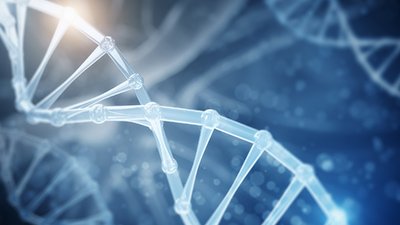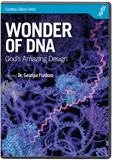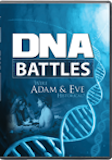DNA—What Does It Prove?
Conferences worldwide are celebrating a landmark in 20th century science—the 50th anniversary of Watson and Crick’s discovery of DNA’s structure (first reported in Nature magazine, 25 April 1953).
This discovery is certainly worthy of note—and celebration. The discovery of DNA’s double-helix structure truly revolutionized biology, opening the door to amazing breakthroughs in our understanding of disease and genetic disorders, and it inspired the just-completed Human Genome Project, hailed as the “periodic table of biology” (see Human Genome Project Complete ... Again).
No More Need For God?
The celebrations have a dark side, however. Many atheistic evolutionists claim that the discovery of DNA’s structure is proof of evolution and a nail in God’s coffin. As they see it, the discovery of a “universal” molecular structure for storing and passing on information to offspring—shared by almost all forms of life1—allows scientists to find a purely physical explanation for the origin and development of life on Earth, without any need for a Creator.
Indeed, both Crick and Watson have been outspoken in their belief that the discovery of DNA’s structure has helped overturn belief in the God of the Bible. Francis Crick has repeatedly said that he sees DNA as a confirmation of evolution, which discredits “the god hypothesis.”2 His co-discoverer, James Watson, says that our understanding of DNA has helped to debunk religious “myths from the past.”
Watson boldly told the London Telegraph in a recent interview, “Every time you understand something, religion becomes less likely. Only with the discovery of the double helix and the ensuing genetic revolution have we had grounds for thinking that the powers held traditionally to be the exclusive property of the gods might one day be ours.”3
Many of the world’s leading scientists will hear this message today at a huge gathering of luminaries (including Watson himself) who traveled to Cambridge to praise the ongoing impact of Watson and Crick’s discovery.
The culmination of the day, after a series of speeches on molecular medicine, cancer, aging, etc., is a lecture titled “Genes and human nature” by Matt Ridley, author of the bestseller Genome. Ridley will speak about the broader implications of human genome research, and it is not hard to guess what he will say.
Scientific American describes Ridley as “an avid proponent of the Darwinian view of the world, [who] perceives the genome not as a cookbook or a manual but as a quintessentially historical document—a three-billion-year memoir of our species from its beginnings in the primal ooze to the present day.”4
Around the world, believers in “goo-to-you” evolution, like Matt Ridley, are repeating the mantra that the human genome holds the key to unlocking the mystery of human nature and the evolution of life on Earth.
What Does DNA Really Show Us?
But is this really what DNA shows us? Ironically, while atheists believe DNA is conclusive evidence of evolution, creationists reach the opposite conclusion.
Unlike the atheists, creationists see the genetic code as astonishing evidence for a Designer, who created a marvelously complex, efficient “information system” for encoding life. The only reasonable explanation for all the information in DNA is that a Designer put all the information in the original genes—e.g. the “kinds” that He made during the six days of Creation.
So how can rational people examining the same facts reach opposite conclusions? The answer is “worldview.” To understand where DNA came from, we must make major assumptions about ancient historical events, which no human beings were present to observe.
Atheists begin with the assumption that the universe has been around for eons and that they can explain everything by time and chance. So they interpret scientific data to fit their assumptions. Those who believe in the Creator of the Bible, however, reject long ages. They believe that God was an eyewitness to the origin of life, and He faithfully recorded these events in His Word. Creationists interpret the data within this framework.
Only One Good Answer
So whose framework makes sense of modern-day scientific facts? AiG has several articles showing how the existence of DNA can not be explained by evolutionary processes (see Genetics: No Friend of Evolution and Jonathan Sarfati’s excellent article in the latest Creation magazine, “DNA: marvelous messages or mostly mess?’5)
It is not enough to explain how DNA might have gathered into strands by random chance; evolutionists must also explain the machinery to interpret DNA. In other words, it’s not enough to explain how random letters could eventually fall into the order S-E-E-T-H-E-D-O-G-R-U-N. These letters still don’t mean anything unless you have a pre-existing language system for interpreting those letters! “See the dog run” has meaning, but only to a modern English-speaker. (The origin of “information” is a critical weakness in evolutionary theory—see Q&A: Information Theory.)
Biochemist Dr Duane Gish, a stalwart in the Creation movement and vice president of the Institute for Creation Research, observes about the human genome: “The genetics are so incredibly complex and can be so marvelously interrelated that it’s absolutely going to demand an intelligent source. The idea that all of this could have come about by random accidents, genetic errors, and so forth is just simply beyond comprehension.”6
He explains, for instance, that cells must have an incredibly sophisticated editing process to ensure that each gene is reproduced error-free. “If life did not have that editing process right at the very start, then it would just mutate right out of existence,” he explains.
“All those errors would slip through—they’d make nonsense, and that would be the end of it. The fact that we have to have that editing process from the very beginning means it had to be created to be there to be effective and to do that work—or life could not exist.”
Conclusion
Yes, this is an appropriate day to celebrate recent advancements in our knowledge of human genetics and biology. But we should be humbled by our knowledge, limited as it is.
Atheists have no explanation for the origin of life or mankind’s sinful nature, in spite of their noises to the contrary. The God of the Bible, on the other hand, has given us the only historical basis for understanding the origin of the human gene—and mankind’s sinful nature—His Word.
Not only is the Creator God the source of all life and the source of our knowledge about life, He is our only hope (through Jesus Christ, the Creator/Savior/Redeemer) to escape the consequences of our evil nature, which blinds us to His truths (1 Corinthians 2:14) and causes us to seek our own way (Romans 3:11).
Footnotes
- But not all life forms have standard DNA.
- Do our genes reveal the hand of God?
‹http://www.telegraph.co.uk/connected/main.jhtml?xml=/connected/2003/03/19/ecfgod19.xml›, 20 March 2003. - Do our genes reveal the hand of God?
‹http://www.telegraph.co.uk/connected/main.jhtml?xml=/connected/2003/03/19/ecfgod19.xml›, 20 March 2003. - ‹http://www.amazon.com/exec/obidos/tg/stores/detail/-/books/0060932902/reviews/103-4581528-4570239#00609329027299›.
- Creation 25(2):26–31
- Brown, J., Researcher: complexity of DNA demands 'intelligent designer' in the process, AgapePress, https://web.archive.org/web/20030412113836/http://headlines.agapepress.org/archive/3/32003e.asp, 3 March 2003.
Recommended Resources

Answers in Genesis is an apologetics ministry, dedicated to helping Christians defend their faith and proclaim the good news of Jesus Christ.
- Customer Service 800.778.3390
- © 2025 Answers in Genesis






